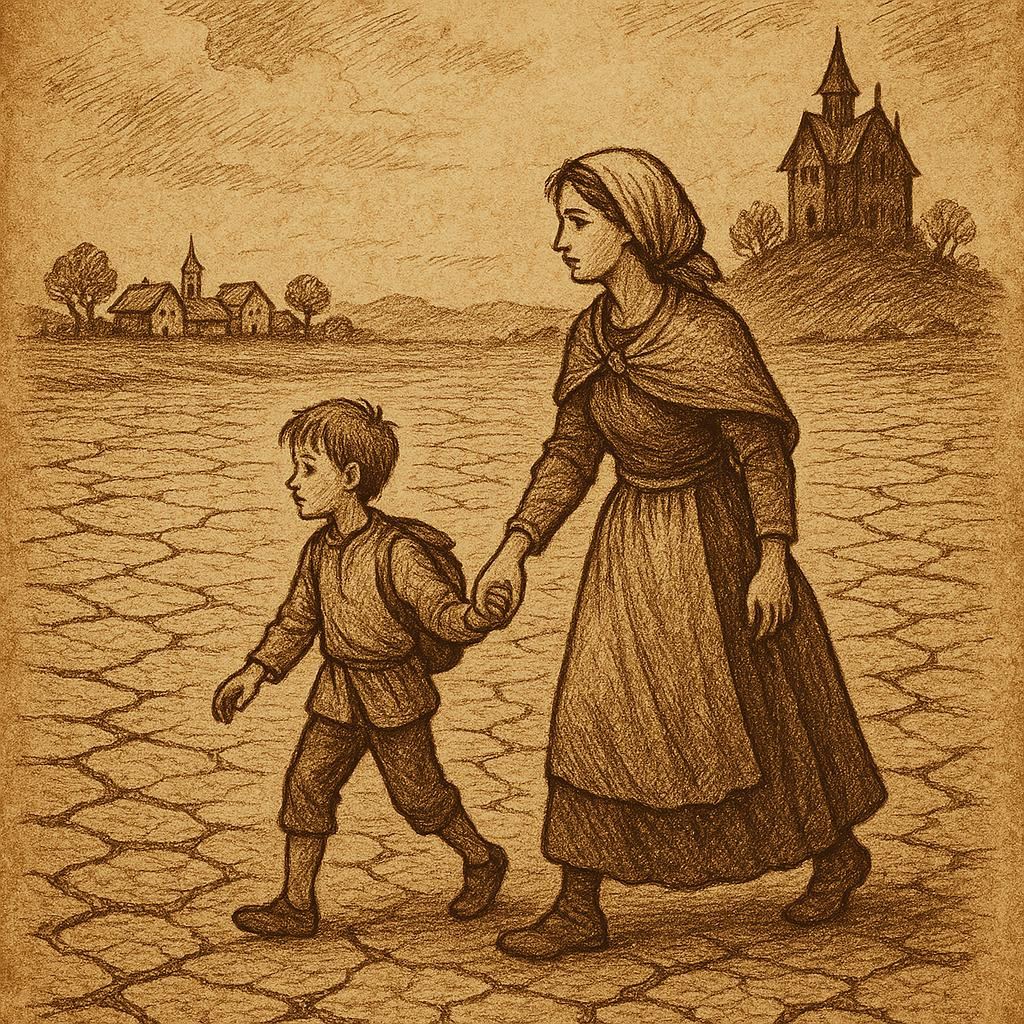Once upon a time, a mother and her young son began a long journey to visit her married daughter far away. They set off early in the morning, carrying a small supply of water and food. As they walked all day, the boy noticed the ground beneath their feet was dry and cracked.
“Mother, why is the land cracked?” he asked.
“The earth is thirsty,” she replied.
The boy thought for a moment. “We have water. Let’s give it to the land.”
“But if we pour out our water, what will we drink when we are thirsty?” the mother warned.
“I am not thirsty now,” said the boy, and he emptied their bottle onto the parched soil.
They continued walking, and soon the boy grew very thirsty.
“Mother, may I have some water?” he pleaded.
READ THIS : The Black Crow
“We have none,” she said sadly. “I told you that pouring water on the land would leave us with none for ourselves.”
As hunger and thirst pressed upon them, they saw a house in the distance. Hoping for help, they approached, but the girl who opened the door warned them.
“My mother is a cannibal,” she said. “You must go away.”
Despite the warning, the mother and son asked for a drink. The girl had been making injera and shared a small amount of water from the batter. Gratefully, they drank and continued on their journey.
When the cannibal mother discovered what had happened, she pursued them, furious. She demanded the girl reveal the direction they had taken. The girl pointed first to one path, then another, until the mother finally discovered the boy and his mother.
“Choose!” the cannibal woman roared. “Whom shall I eat first?”
The boy, not understanding, said, “Eat me.” His mother intervened. “No, eat me, not him!” she cried.
The cannibal attacked, and the mother was killed. But the boy escaped. He ran until he reached a village where children were herding goats. He asked about his sister, Anina, and was sent from one herder to another, performing tasks to prove himself.
At last, he reached Anina’s home, where her husband, cautious and suspicious, tested him further. The boy completed impossible tasks, learning patience and ingenuity along the way.
Above the village, the mother’s spirit appeared in the form of birds, singing and guiding her son. Through their messages, Anina realized her brother’s identity. The boy was reunited with his sister, and together they found justice. Anina’s husband, who had tried to deceive them, was punished, and the family was finally safe.
Moral Lesson
Kindness, courage, and patience guide us through hardship. Even when we face danger, deceit, and loss, persistence and cleverness can save lives. The boy’s willingness to help the thirsty land and persevere through impossible tasks ultimately led to reunion, justice, and survival.
Knowledge Check
Why was the land cracked when the boy and his mother walked?
The land was dry and thirsty because there had been no rain, showing the harsh effects of drought.What lesson did the boy learn when he poured water on the cracked land?
He learned that good intentions must be balanced with practical needs, as they lost their water and became thirsty.Who helped the boy when he needed water?
The daughter of the cannibal woman gave him water from the injera batter.How did the boy eventually find his sister Anina?
He completed tasks given by various herders and learned her location through guidance from the mother’s spirit birds.What role did the mother’s spirit play in the story?
She appeared as birds to guide and communicate with her son, ensuring he survived and reunited with his sister.What is the main moral of The Cracked Land of Drought?
Courage, persistence, and wisdom help overcome danger, deceit, and hardship. Helping others and remaining patient leads to safety and reunion.
Cultural Origin: Somalia (Eastern African Folktale)






